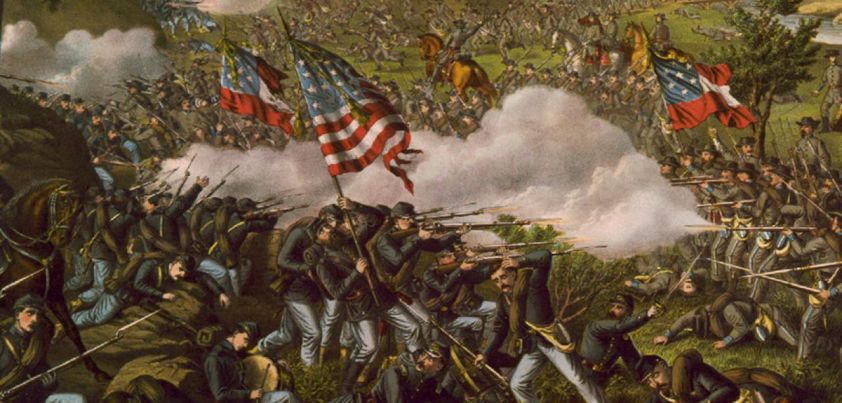 This American Civil War story by Ambrose Bierce develops an increasingly ominous tone after a six-year-old boy becomes lost in the woods while playing soldier. He mysteriously sleeps through a bloody battle, wakes to find himself confronted by hundreds of badly wounded and dying soldiers, and silently “leads” them towards a red glow, which turns out to be his burning home. As he stands making “animal noises” over the gory remains of his dead mother, we learn the reason for some of his unusual behavior. Themes: the fantasy (glory) vs. reality (horror) of war, perception (childhood innocence vs. adult awareness). More…
This American Civil War story by Ambrose Bierce develops an increasingly ominous tone after a six-year-old boy becomes lost in the woods while playing soldier. He mysteriously sleeps through a bloody battle, wakes to find himself confronted by hundreds of badly wounded and dying soldiers, and silently “leads” them towards a red glow, which turns out to be his burning home. As he stands making “animal noises” over the gory remains of his dead mother, we learn the reason for some of his unusual behavior. Themes: the fantasy (glory) vs. reality (horror) of war, perception (childhood innocence vs. adult awareness). More…
Archives
On the Rainy River
 The major themes of this “memoir” by Tim O’Brien are shame and guilt. Its purpose is to mitigate the trauma of events twenty years earlier when, as a twenty-one-year-old, the writer was drafted to fight in Vietnam. Ironically, he feels both emotions: 1) for his initial decision to flee America to avoid fighting in a war he didn’t believe in; and 2) for putting his convictions aside, going to war, and things he did and/or was exposed to during the conflict. Other themes: moral confusion, civic duty, fear (embarrassment/social stigma vs. injury or death), connection, courage and cowardice. More…
The major themes of this “memoir” by Tim O’Brien are shame and guilt. Its purpose is to mitigate the trauma of events twenty years earlier when, as a twenty-one-year-old, the writer was drafted to fight in Vietnam. Ironically, he feels both emotions: 1) for his initial decision to flee America to avoid fighting in a war he didn’t believe in; and 2) for putting his convictions aside, going to war, and things he did and/or was exposed to during the conflict. Other themes: moral confusion, civic duty, fear (embarrassment/social stigma vs. injury or death), connection, courage and cowardice. More…
All the King’s Horses
 The major theme of this Cold War allegory from Kurt Vonnegut is the human cost involved in resolving armed conflicts. The focus of the story is the moral dilemma faced by those in ultimate command… the need to put personal feelings aside and make strategic decisions that are likely to result in collateral losses. The story also reflects the dynamics of power in war: how the ordinary soldier, general population, and even vassal powers such as Pi Ying’s rebels, are mere pawns in a “game” beyond their control. Other themes: cruelty, dehumanization, sacrifice, manipulation. More…
The major theme of this Cold War allegory from Kurt Vonnegut is the human cost involved in resolving armed conflicts. The focus of the story is the moral dilemma faced by those in ultimate command… the need to put personal feelings aside and make strategic decisions that are likely to result in collateral losses. The story also reflects the dynamics of power in war: how the ordinary soldier, general population, and even vassal powers such as Pi Ying’s rebels, are mere pawns in a “game” beyond their control. Other themes: cruelty, dehumanization, sacrifice, manipulation. More…
Yesterday was Beautiful
 With the devastation currently taking place in Ukraine, we have decided to feature a story highlighting the misery of innocent victims of war. Roald Dahl’s short stories are known for their dark comedy and unexpected endings. There is nothing funny about this story. However, he does manage an unexpected twist that emphasizes the overall theme reflected in the title: In war, things can go from “beautiful” to your worst nightmare overnight. Other themes: (for civilians) indiscriminate bombing, senseless death and destruction, psychological trauma, anger, revenge; (for combatants) collateral damage, personal survival. More…
With the devastation currently taking place in Ukraine, we have decided to feature a story highlighting the misery of innocent victims of war. Roald Dahl’s short stories are known for their dark comedy and unexpected endings. There is nothing funny about this story. However, he does manage an unexpected twist that emphasizes the overall theme reflected in the title: In war, things can go from “beautiful” to your worst nightmare overnight. Other themes: (for civilians) indiscriminate bombing, senseless death and destruction, psychological trauma, anger, revenge; (for combatants) collateral damage, personal survival. More…
The War Prayer
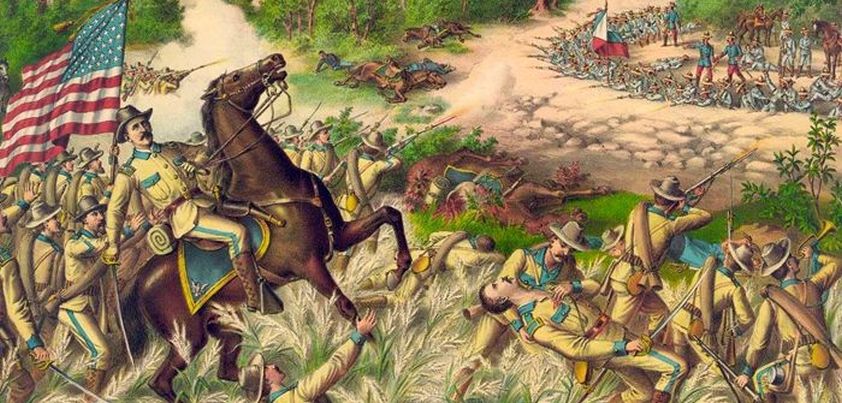 Following Russia’s recent invasion of Ukraine, it seems appropriate to feature one of literature’s most famous “anti-war” stories. Written in 1905, this narrative essay by Samuel Clemens (aka Mark Twain) is a condemnation of the American imperialist agenda that led to the Spanish and Filipino-American Wars. With his usual sarcasm and wit, Twain brushes aside patriotic bravado and poignantly focuses on the suffering of combatants and civilians on both sides. Themes: patriotism, the horrors of war, the connection between the church (religion) and war, the selfish one-sidedness of war prayers vs. the universality of God. More…
Following Russia’s recent invasion of Ukraine, it seems appropriate to feature one of literature’s most famous “anti-war” stories. Written in 1905, this narrative essay by Samuel Clemens (aka Mark Twain) is a condemnation of the American imperialist agenda that led to the Spanish and Filipino-American Wars. With his usual sarcasm and wit, Twain brushes aside patriotic bravado and poignantly focuses on the suffering of combatants and civilians on both sides. Themes: patriotism, the horrors of war, the connection between the church (religion) and war, the selfish one-sidedness of war prayers vs. the universality of God. More…
Cranes
 Hwang Sun-won’s Cranes shows how humanity can outweigh ideology. Two childhood friends find themselves on opposite sides in the Korean War. One, a village commander, is captured and the other assigned to take him for interrogation and probable execution. When asked why he did not flee, the captured man talks about his aged father’s connection to the land. The other man can relate to this, because he carries the guilt of having left his family when he went away to war. This prompts the captor to suggest they go off on a crane hunt, as they did once as boys. More…
Hwang Sun-won’s Cranes shows how humanity can outweigh ideology. Two childhood friends find themselves on opposite sides in the Korean War. One, a village commander, is captured and the other assigned to take him for interrogation and probable execution. When asked why he did not flee, the captured man talks about his aged father’s connection to the land. The other man can relate to this, because he carries the guilt of having left his family when he went away to war. This prompts the captor to suggest they go off on a crane hunt, as they did once as boys. More…
A Horseman in the Sky
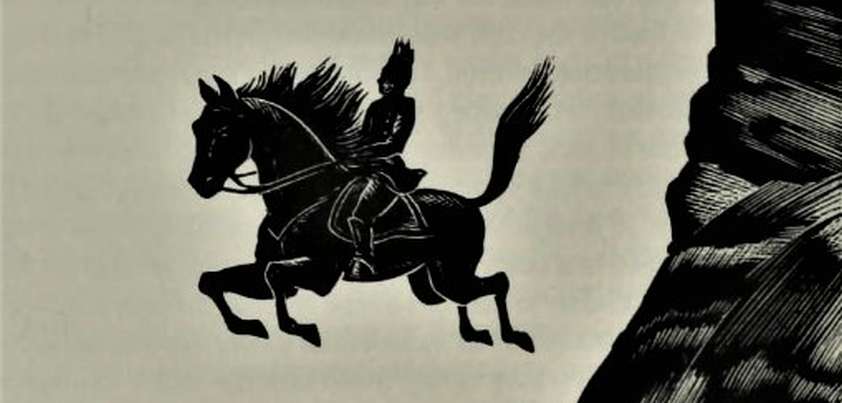 This war story from Ambrose Bierce has three main themes: 1) honor and the need to do ones duty; 2) the brutality of any kind of war; and 3) the particularly cruel nature of civil war, which can set friend against friend and family against family. For me, the defining moment in the story is when the enemy soldier turns and seemingly looks into Carter Druse’s eyes. As Carter recognizes his father, does his father also see and recognize him? Could knowing that Carter did his duty explain the proud way the horseman appeared to ‘ride’ through the sky? More…
This war story from Ambrose Bierce has three main themes: 1) honor and the need to do ones duty; 2) the brutality of any kind of war; and 3) the particularly cruel nature of civil war, which can set friend against friend and family against family. For me, the defining moment in the story is when the enemy soldier turns and seemingly looks into Carter Druse’s eyes. As Carter recognizes his father, does his father also see and recognize him? Could knowing that Carter did his duty explain the proud way the horseman appeared to ‘ride’ through the sky? More…
In the Shadow of War
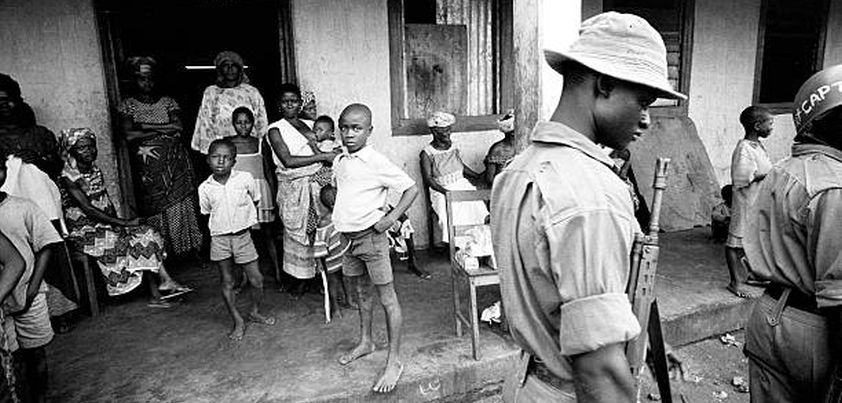 In this story by Ben Okri, a boy becomes curious about a mysterious woman who walks through his village every day wearing a black veil. Set during the Nigerian Civil War, other children think she is a witch; three soldiers looking for her think she is a spy. The soldiers follow the woman into a forest, as does the boy. Sufficient ambiguity exists for readers to question whether the horrific events described in the forest really take place, or if the woman is indeed a spy, or a kindly benefactor. Themes include loyalty and morality in war, brutality, humanity. More…
In this story by Ben Okri, a boy becomes curious about a mysterious woman who walks through his village every day wearing a black veil. Set during the Nigerian Civil War, other children think she is a witch; three soldiers looking for her think she is a spy. The soldiers follow the woman into a forest, as does the boy. Sufficient ambiguity exists for readers to question whether the horrific events described in the forest really take place, or if the woman is indeed a spy, or a kindly benefactor. Themes include loyalty and morality in war, brutality, humanity. More…
How to Tell a True War Story
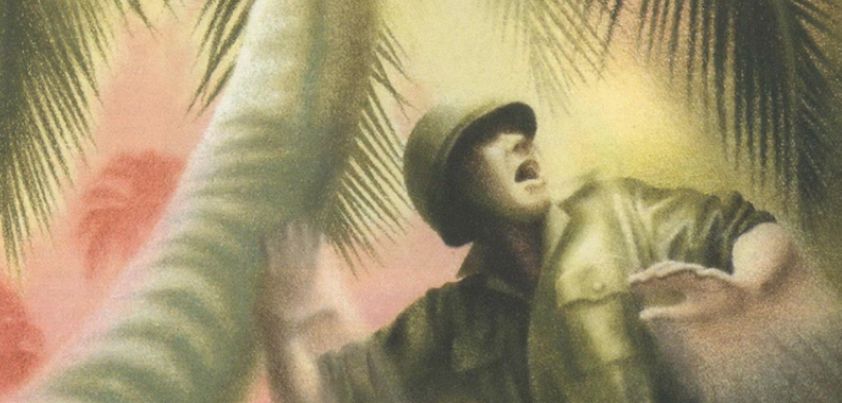 This metafictional story by Tim O’Brien uses observations on a small collection of stories related by soldiers to highlight the difficulty of faithfully communicating one’s wartime experiences. His central argument is that in war it’s difficult to separate what happened from what seemed to happen and therefore you lose your sense of the definite, hence your sense of truth itself. This leads to the seemingly paradoxical conclusion that in a true war story nothing is ever absolutely true. Themes include the nature of truth in storytelling, memories vs. imagination, the trauma of war, morality. More…
This metafictional story by Tim O’Brien uses observations on a small collection of stories related by soldiers to highlight the difficulty of faithfully communicating one’s wartime experiences. His central argument is that in war it’s difficult to separate what happened from what seemed to happen and therefore you lose your sense of the definite, hence your sense of truth itself. This leads to the seemingly paradoxical conclusion that in a true war story nothing is ever absolutely true. Themes include the nature of truth in storytelling, memories vs. imagination, the trauma of war, morality. More…
Mary Postgate
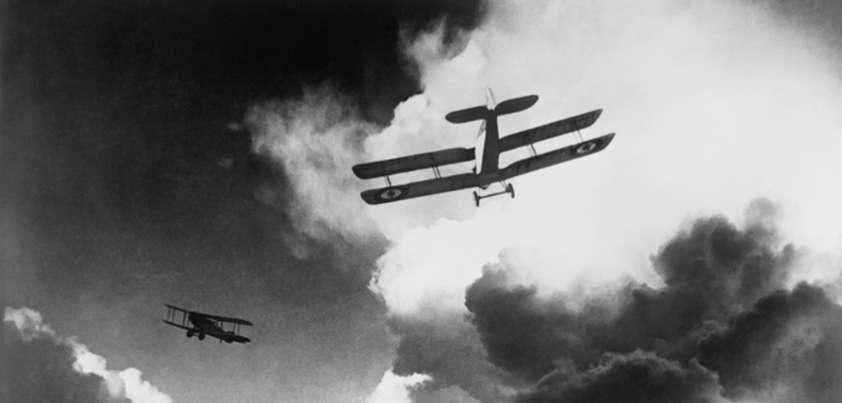 Set in World War 1, Rudyard Kipling‘s Mary Postgate, can be interpreted in a number of ways, each of which suggests a different reason for the unusual reaction of the protagonist (a prim, proper, middle-aged spinster) to watching the slow, painful death of a seriously injured pilot. Her almost orgasmic physical response and subsequent behavior – a luxurious hot bath before tea – indicate that she found it an uplifting experience. This suggests that her bitterness was directed at not only the enemy, but also other aspect(s) of her life. Themes: the brutality of war, repression, loss, anger, revenge, release. More…
Set in World War 1, Rudyard Kipling‘s Mary Postgate, can be interpreted in a number of ways, each of which suggests a different reason for the unusual reaction of the protagonist (a prim, proper, middle-aged spinster) to watching the slow, painful death of a seriously injured pilot. Her almost orgasmic physical response and subsequent behavior – a luxurious hot bath before tea – indicate that she found it an uplifting experience. This suggests that her bitterness was directed at not only the enemy, but also other aspect(s) of her life. Themes: the brutality of war, repression, loss, anger, revenge, release. More…
For Esmé with Love and Squalor
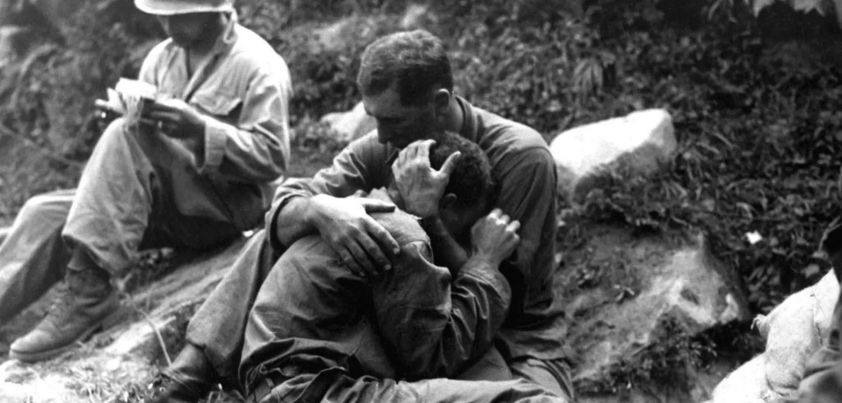 J. D. Salinger’s Esmé is a precocious, orphaned teenage girl whose friendship and compassion help a young American soldier deal with the horrors of war. Salinger’s characterization of the soldier (Staff Sergeant X) in the second part of the story suggests first-hand experience with PTSD. This was misunderstood at the time, as reflected in the comment from Clay’s girlfriend: nobody gets a nervous breakdown just from the war and all. She says you probably were unstable like, your whole goddam life. Major themes: youthful innocence, the brutality of war and its effect on mental health, loss, humanity and hope. More…
J. D. Salinger’s Esmé is a precocious, orphaned teenage girl whose friendship and compassion help a young American soldier deal with the horrors of war. Salinger’s characterization of the soldier (Staff Sergeant X) in the second part of the story suggests first-hand experience with PTSD. This was misunderstood at the time, as reflected in the comment from Clay’s girlfriend: nobody gets a nervous breakdown just from the war and all. She says you probably were unstable like, your whole goddam life. Major themes: youthful innocence, the brutality of war and its effect on mental health, loss, humanity and hope. More…
Armistice
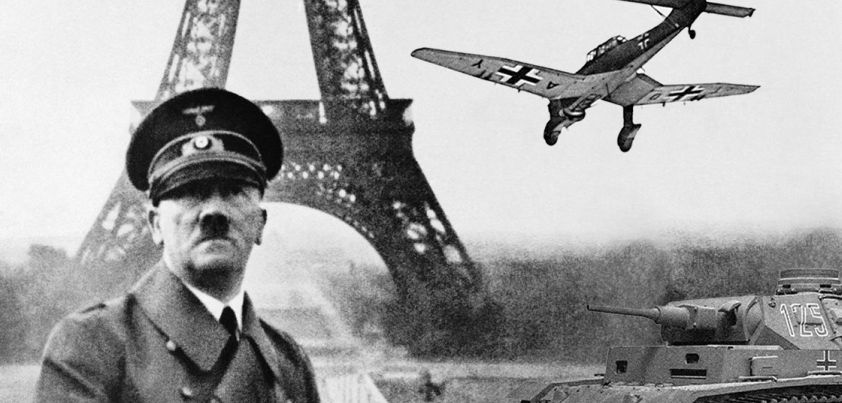 The major themes of this story from Bernard Malamud are violence, ethnic cleansing, war, racism, and compromised morals. Increasing tension between Jewish grocer Morris and German small-goods provider Gus mirrors unfolding events in Eastern Europe in the lead up to France’s surrender in World War Two. Morris, who witnessed the violent Russian pogroms against his people, is concerned the same will happen in France. Fascist-leaning Gus believes the invasion is justified because of France’s poor treatment of Germany following World War One. However, neither party feels strongly enough to terminate their business relationship for fear of losing money. More…
The major themes of this story from Bernard Malamud are violence, ethnic cleansing, war, racism, and compromised morals. Increasing tension between Jewish grocer Morris and German small-goods provider Gus mirrors unfolding events in Eastern Europe in the lead up to France’s surrender in World War Two. Morris, who witnessed the violent Russian pogroms against his people, is concerned the same will happen in France. Fascist-leaning Gus believes the invasion is justified because of France’s poor treatment of Germany following World War One. However, neither party feels strongly enough to terminate their business relationship for fear of losing money. More…
Stop the Sun
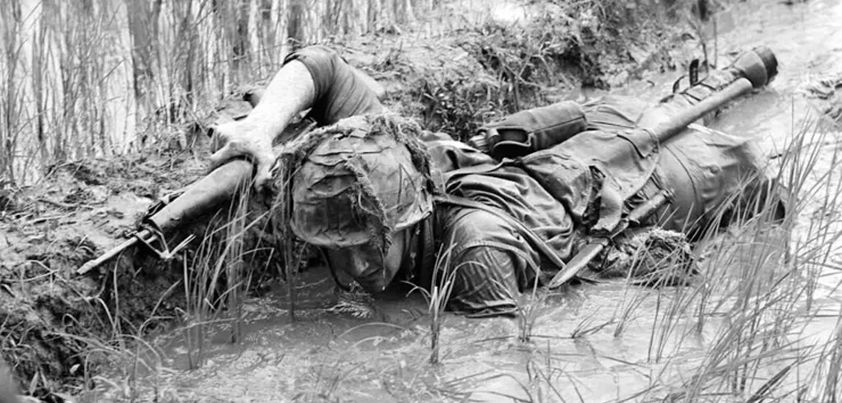 This story by Gary Paulsen focuses on an adolescent boy’s efforts to understand his father’s unusual behavioral lapses, which his mother describes as “Vietnam Syndrome”. He is uncomfortable with the behavior at home and embarrassed when it manifests itself in public. Initially, he tries to research the condition at the library and by asking teachers. When this doesn’t work, he has the courage to ask his father. What he learns brings a measure of understanding, and gives him the strength to be more tolerant. Themes: father-son relationships, the brutality of war and its after-effects on veterans, communication, understanding and tolerance. More…
This story by Gary Paulsen focuses on an adolescent boy’s efforts to understand his father’s unusual behavioral lapses, which his mother describes as “Vietnam Syndrome”. He is uncomfortable with the behavior at home and embarrassed when it manifests itself in public. Initially, he tries to research the condition at the library and by asking teachers. When this doesn’t work, he has the courage to ask his father. What he learns brings a measure of understanding, and gives him the strength to be more tolerant. Themes: father-son relationships, the brutality of war and its after-effects on veterans, communication, understanding and tolerance. More…
A Mystery of Heroism
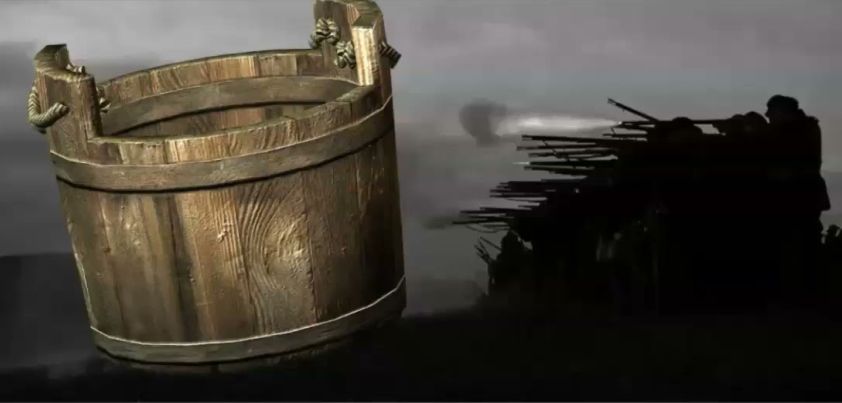 As the title suggests, this story from Stephen Crane explores the concept of what makes a “hero”. In trying to answer the question, the story considers issues such as recklessness vs. bravery and the danger of bravado. It also touches on perspectives of heroism. To an injured officer, the protagonist is a hero; to his fellow soldiers, he is an impetuous fool. The irony of a dropped bucket at the end of the story suggests that many acts of heroism in wartime are wasted, having no impact on the outcome. Themes: war, duty, death, bravado, pride, heroism. More…
As the title suggests, this story from Stephen Crane explores the concept of what makes a “hero”. In trying to answer the question, the story considers issues such as recklessness vs. bravery and the danger of bravado. It also touches on perspectives of heroism. To an injured officer, the protagonist is a hero; to his fellow soldiers, he is an impetuous fool. The irony of a dropped bucket at the end of the story suggests that many acts of heroism in wartime are wasted, having no impact on the outcome. Themes: war, duty, death, bravado, pride, heroism. More…
The 13-Carat Diamond
 Khin Mya (aka Khin Myo Chit) is one of a small number of recognized Burmese (now Myanmars) authors who wrote in English as well as their native tongue. The story takes place during World War II at the time the Japanese occupied Burma. It tells of the humorous experiences of a young couple who are finding it hard to make ends meet. The woman fails at running a market stall, and comes up with a plan to become rich overnight. All she has to do is find someone with a 13-carat diamond they are willing sell. More…
Khin Mya (aka Khin Myo Chit) is one of a small number of recognized Burmese (now Myanmars) authors who wrote in English as well as their native tongue. The story takes place during World War II at the time the Japanese occupied Burma. It tells of the humorous experiences of a young couple who are finding it hard to make ends meet. The woman fails at running a market stall, and comes up with a plan to become rich overnight. All she has to do is find someone with a 13-carat diamond they are willing sell. More…
The Dog of Tithwal
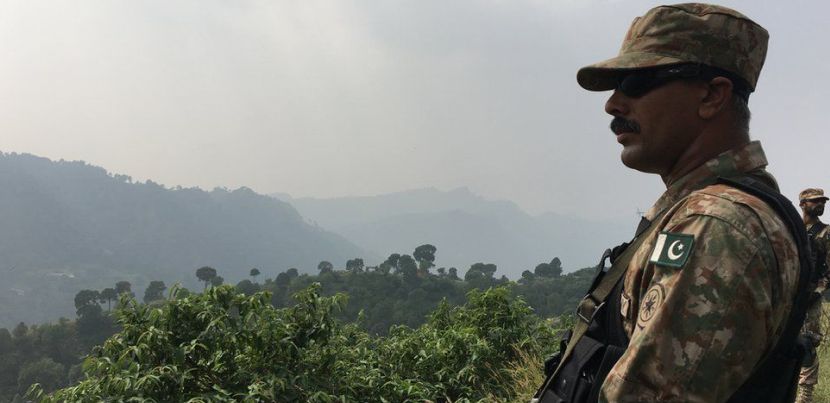 This story from Saadat Hasan Manto takes place during the first Indo-Pakistan (Kashmir) War, which commenced just two months after the 1947 formation of the two countries. The war was a form of “Mexican standoff”. This is reflected in the plot, where soldiers break their boredom with occasional shots towards the enemy camp that have no chance of hitting anyone. The treatment and killing of Jhun Jhun for “refusing” to take sides is symbolic of the suffering of civilians caught up in the conflict. Themes: natural peace and harmony vs. mankind’s propensity for violence, futility, innocence, distrust, cruelty, human suffering. More…
This story from Saadat Hasan Manto takes place during the first Indo-Pakistan (Kashmir) War, which commenced just two months after the 1947 formation of the two countries. The war was a form of “Mexican standoff”. This is reflected in the plot, where soldiers break their boredom with occasional shots towards the enemy camp that have no chance of hitting anyone. The treatment and killing of Jhun Jhun for “refusing” to take sides is symbolic of the suffering of civilians caught up in the conflict. Themes: natural peace and harmony vs. mankind’s propensity for violence, futility, innocence, distrust, cruelty, human suffering. More…
The Things They Carried
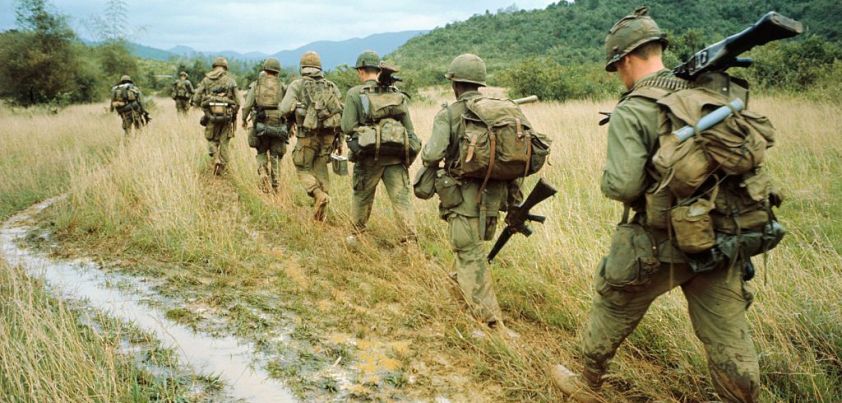 The strength of this Vietnam War memoir by Tim O’Brien is the matter-of-fact way the life of the soldiers (“grunts”) is portrayed. Although the military and survival equipment carried by the men is listed, the major theme of the story is the emotional burdens they carried – both those the men brought to the war, and those they took on during its course. First Lieutenant Jimmy Cross learns an important lesson: in order to do your duty and survive the war, you need to find a way to let go of these. Other themes: war, love, individual and collective responsibility. More…
The strength of this Vietnam War memoir by Tim O’Brien is the matter-of-fact way the life of the soldiers (“grunts”) is portrayed. Although the military and survival equipment carried by the men is listed, the major theme of the story is the emotional burdens they carried – both those the men brought to the war, and those they took on during its course. First Lieutenant Jimmy Cross learns an important lesson: in order to do your duty and survive the war, you need to find a way to let go of these. Other themes: war, love, individual and collective responsibility. More…
Naming the Names
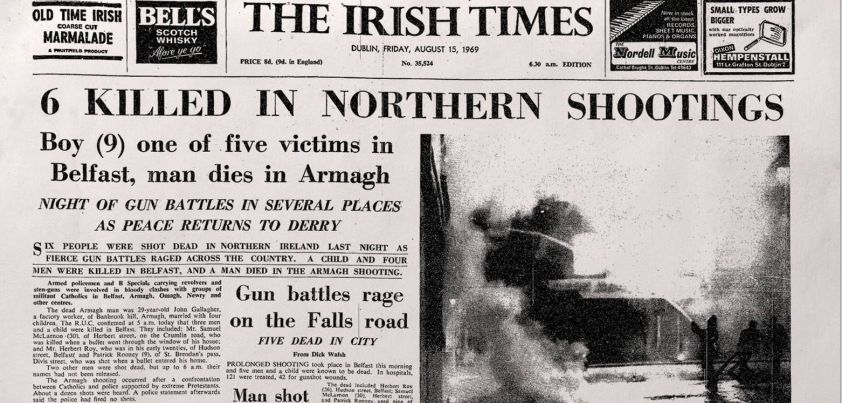 Set during the Irish Troubles, the major themes of his story by Anne Devlin are love, loyalty and betrayal. Other themes include identity, the cyclical nature of violence, urban change/devastation, taking responsibility for one’s actions, and the humanization of terrorism. The plot is non-linear, with regular flashbacks to earlier times. An insecure woman who has been indoctrinated in the Republican cause since childhood joins the IRA. She plays a minor role until a decision is made to target a prominent British official, and finds herself perfectly placed to lure his son (who is also her lover!) into a deadly trap.
Set during the Irish Troubles, the major themes of his story by Anne Devlin are love, loyalty and betrayal. Other themes include identity, the cyclical nature of violence, urban change/devastation, taking responsibility for one’s actions, and the humanization of terrorism. The plot is non-linear, with regular flashbacks to earlier times. An insecure woman who has been indoctrinated in the Republican cause since childhood joins the IRA. She plays a minor role until a decision is made to target a prominent British official, and finds herself perfectly placed to lure his son (who is also her lover!) into a deadly trap.
More…
In Another Country
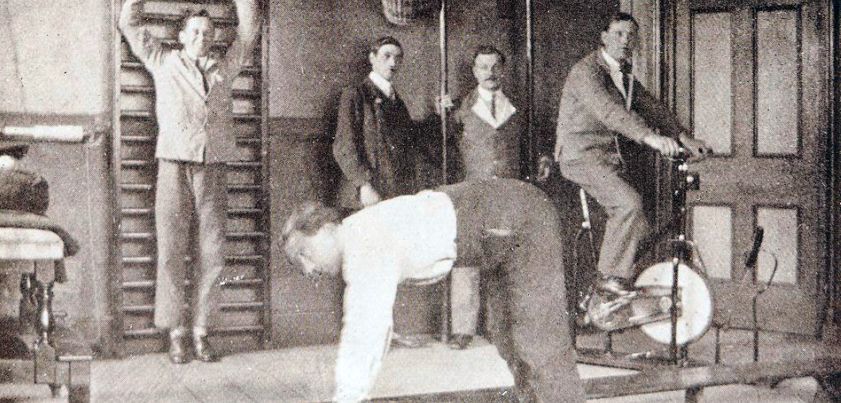 Set during World War 1, the major theme of his story by Ernest Hemingway is courage: courage to face an enemy in war, and courage to try to rebuild one’s life after being badly injured or suffering a major setback. A wounded American, thought to be Hemingway’s alter ego Nick Adams, visits a Milan hospital every day for exercises to rehabilitate a wounded knee. He shares his fears about returning to the front, and his relationship and experiences with five Italian soldiers undergoing treatment. Other themes: dealing with disability and loss, fear of death, camaraderie, dignity vs. bravado, alienation, loneliness. More…
Set during World War 1, the major theme of his story by Ernest Hemingway is courage: courage to face an enemy in war, and courage to try to rebuild one’s life after being badly injured or suffering a major setback. A wounded American, thought to be Hemingway’s alter ego Nick Adams, visits a Milan hospital every day for exercises to rehabilitate a wounded knee. He shares his fears about returning to the front, and his relationship and experiences with five Italian soldiers undergoing treatment. Other themes: dealing with disability and loss, fear of death, camaraderie, dignity vs. bravado, alienation, loneliness. More…
An Occurrence at Owl Creek Bridge
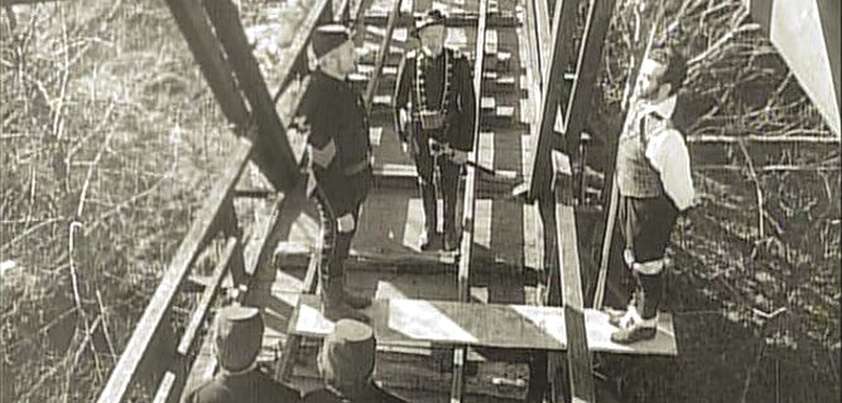 This Ambrose Bierce story contains some of the best descriptive language in American literature… so much so that most people will need to read the passage at least twice in order to properly appreciate it. All I can say about the plot without spoiling the experience for those who haven’t read it is that the surprise ending usually sticks in reader’s minds for some time. The major themes: sense of duty; love and sacrifice; the brutality of war; confronting death; near-death experiences; and time (the length of a moment) as reflected in the personification metaphor time stood still. More…
This Ambrose Bierce story contains some of the best descriptive language in American literature… so much so that most people will need to read the passage at least twice in order to properly appreciate it. All I can say about the plot without spoiling the experience for those who haven’t read it is that the surprise ending usually sticks in reader’s minds for some time. The major themes: sense of duty; love and sacrifice; the brutality of war; confronting death; near-death experiences; and time (the length of a moment) as reflected in the personification metaphor time stood still. More…